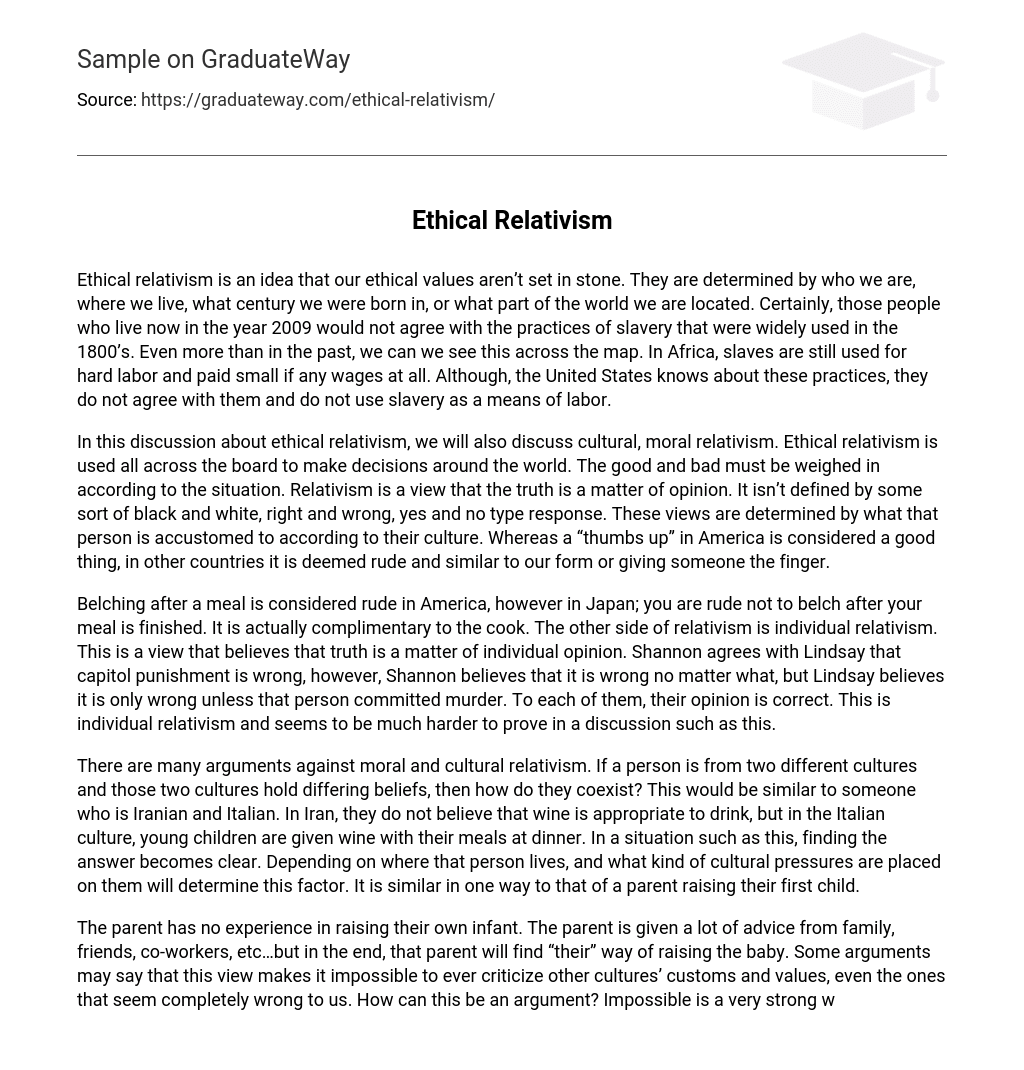Ethical relativism states that our ethical values are not fixed, but rather influenced by factors like cultural background, geographical location, era, and individual identities. For instance, the ethical values of people in 2009 would be different from those who lived in the time when slavery was common in the 1800s. This concept is evident globally, particularly in Africa where slavery still exists as a form of labor without fair pay for the slaves’ hard work. In contrast, the United States condemns such practices and does not use slavery as a labor method.
In this discussion, we will examine the relationship between ethical relativism and cultural and moral relativism. Ethical relativism is a widely adopted approach globally for decision-making. The determination of what is considered good or bad depends on the particular circumstances, as relativism suggests that truth is subjective and varies among individuals. This perspective is influenced by cultural norms and familiarities. For example, while Americans perceive a “thumbs up” gesture positively, it may be offensive in other countries similar to our equivalent of giving someone the finger.
In America, it is considered impolite to belch after a meal, whereas in Japan, not belching after finishing a meal is considered impolite. In Japan, belching after a meal is viewed as a compliment to the chef. Another aspect of relativism is individual relativism, which states that truth is subjective and varies based on individual opinions. Both Shannon and Lindsay agree that capital punishment is immoral. However, Shannon believes it is always immoral, while Lindsay believes it is only immoral if the person committed murder. Each of them considers their opinion to be correct, highlighting the concept of individual relativism, which poses a challenge in discussing this topic.
Critics have expressed concerns about moral and cultural relativism, particularly when individuals belong to two cultures with conflicting beliefs. Take, for example, someone who identifies as both Iranian and Italian. In Iranian culture, the consumption of wine is discouraged, while in Italian culture, young children are served wine with their meals. Resolving this conflict requires considering the person’s place of residence and the cultural influences they encounter. A similar situation can be seen in first-time parents raising their child.
The parent seeks guidance from different sources, such as family, friends, and co-workers because of their limited experience in raising a baby. As time passes, the parent will develop their own distinct parenting style. Some argue that this viewpoint hampers our capacity to criticize customs and values of diverse cultures, even if they seem completely wrong to us. However, can we genuinely not make such an argument? Instead of asserting it is impossible – which conveys a negative tone – it might be more accurate to characterize it as challenging, difficult or even absurd.
While it is generally discouraged in most cultures to criticize local customs or values, certain cultures impose severe consequences, such as death, for such criticism. In the United States, citizens enjoy the freedom to openly express their opinions on local governments. One highly debated issue pertaining to cultural relativism is female genital mutilation (FGM), which entails the partial or complete removal of external female genitalia. This can involve eliminating the clitoris and labia in order to suppress girls’ sexual desires. Additionally, all types of FGM also include stitching up the vaginal opening to prevent premarital intercourse.
The World Health Organization considers female genital mutilation (FGM) a significant violation of girls’ and women’s human rights. The Female Genital Cutting Education and Networking Project states that around 3 million African infants and young girls undergo this practice annually. In this case, cultural relativism offers an alternative viewpoint. Are there any reasons or justifications for these actions? Are there any justifications for these practices?
Viewing the situation from a different perspective, we observe the hardships faced by an 8-year-old girl in a small African village. Her mother imparts valuable knowledge to her, such as cooking and familial responsibilities, while also imparting wisdom. Nevertheless, all the other girls in the village have undergone female genital mutilation (FGM), a practice aimed at preserving their chastity and preparing them for marriage and adulthood. If this young girl decides against undergoing the same procedure as her peers, she will face isolation from her loved ones.
When faced with no money or food, she turns to prostitution as a means of survival, which is a distressing situation. This raises the question: which scenario is more concerning? Can we view prostitution as the lesser evil? While female genital mutilation (FGM) is widely considered abhorrent and unethical, determining the severity of each act becomes challenging. Both actions result in long-lasting physical, emotional, and psychological harm, making it difficult to determine which is worse or what defines moral correctness. Is cultural significance alone enough justification for accepting it universally? Both situations require a comprehensive examination of historical context and factual information.
It would be highly unlikely to achieve an educated decision that involves everyone’s opinion. I believe cultural relativism is an important element in maintaining the delicate balance of diverse cultures. Tolerance is the key word in this discussion, defined as “permitting without protest or interference” (Oxford University Press). This approach is sometimes used when dealing with international boundaries. Ignorance can sometimes shield people from harm. Sadly, in the case of FGM, it is unfortunate that more people are unaware of the subject and more girls suffer as a result.





